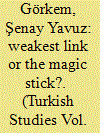| Srl | Item |
| 1 |
ID:
114947


|
|
|
|
|
| Publication |
2012.
|
| Summary/Abstract |
This essay compares the role of the social networking sites, Facebook in Finland and Vkontakte in Russia, in organising civic activism. It is based on data collected about two successful campaigns mobilised by local residents against urban building projects in St Petersburg and Helsinki in 2009. Though in both cities these sites were important channels for transmitting information and organising and coordinating the campaigns, their role was clearly limited in terms of impartial, democratic discussion of the issue of common concern: the sites were rather used to build and reinforce emerging collective identities and to create consensus within the movement. In contrast to the situation in Helsinki, Vkontakte also had a central role in creating and maintaining ties between formerly isolated campaigns against building projects elsewhere in St Petersburg, thereby helping to build a 'network of grassroots resistance' in the city.
|
|
|
|
|
|
|
|
|
|
|
|
|
|
|
|
| 2 |
ID:
151666


|
|
|
|
|
| Summary/Abstract |
This article summarizes the first part of the findings of a larger study which gathers data on Turkish activists’ perceptions on the scope, strength and limitations of digital activism. Specifically, the study explores what strength Turkish activists attribute to digital activism in achieving certain objectives, whether Turkish activists are optimistic, pessimistic or persistent in their attributions related to digital activism, and whether they believe in the possibility of an e-revolution. Both quantitative and qualitative data were collected via a web-based survey of 302 activists. The survey employed a Likert Scale to measure the efficacy that Turkish activists attribute to digital activism in achieving different objectives as well as six open-ended questions that provide in-depth qualitative data.
|
|
|
|
|
|
|
|
|
|
|
|
|
|
|
|